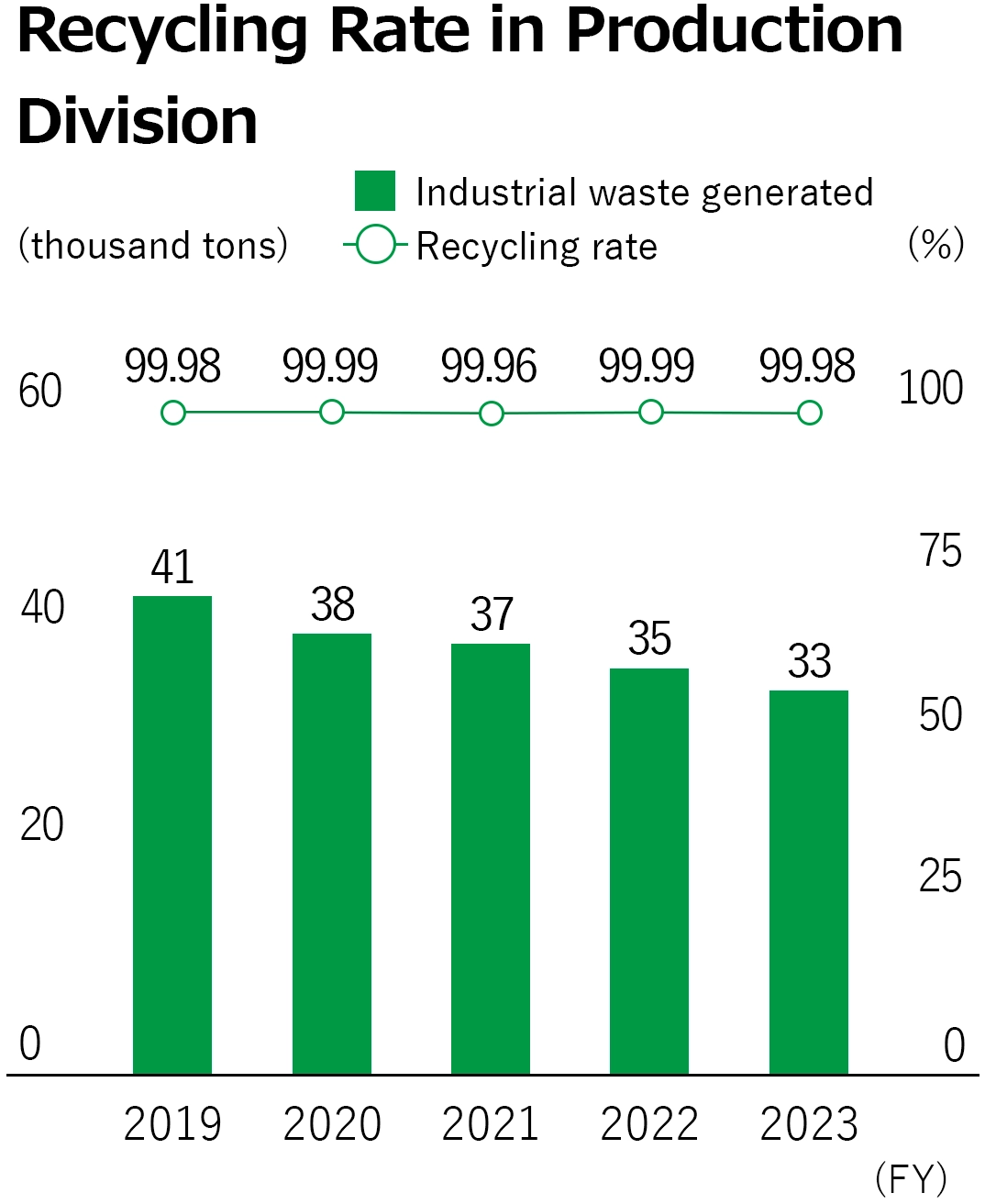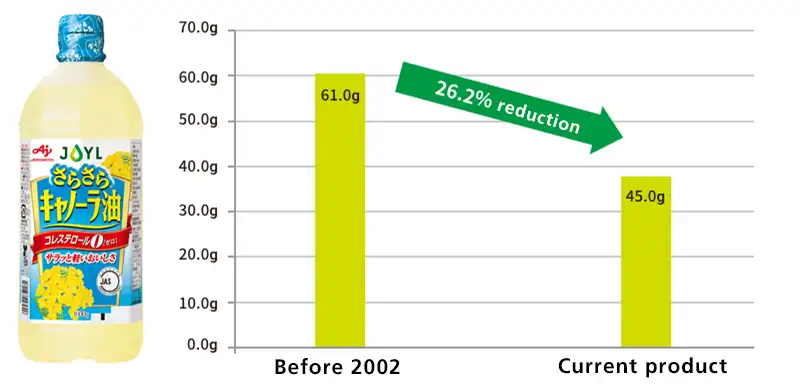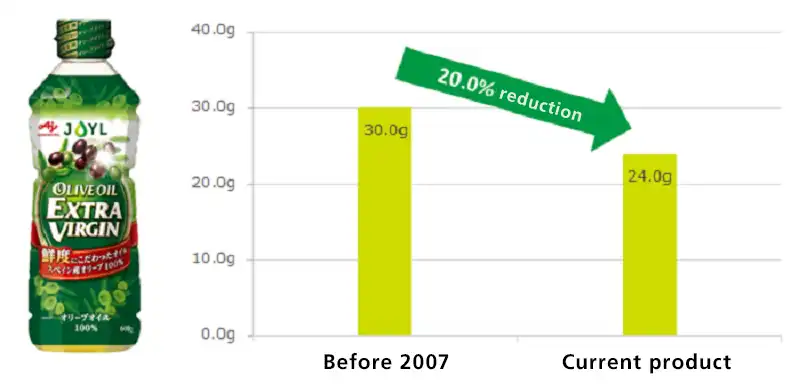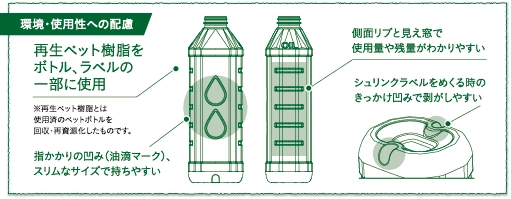Waste reduction and recycling
Overview
At J-OIL MILLS' production sites, we promote waste reduction and recycling, and achieve zero emissions* every year. In fiscal 2023, we will continue to promote the conversion of waste into valuable materials, and maintain and maintain our target recycling rate of 99.9% or more in our production divisions. We will continue to strive to reduce the amount of energy, raw materials, water, and other inputs, and initiatives to reduce and recycle pollutants and waste emissions. In addition, we will strive to reduce the amount of plastic derived from fossil fuels, and non-production divisions will also hold e-learning and environmental seminars on waste, and the entire company will work to maximize resource utilization efficiency.
*At our company, we define zero emissions as not incinerating or disposing of industrial waste generated at Plant and offices in landfills (recycling rate of 99.9% or more).

Proper management of chemical substances
Regarding the chemical substances we handle, we strive to properly manage them in accordance with laws and regulations such as the Act on Promotion of the Reporting and Management of Chemical Substances (PRTR Act), and we also manage other chemical substances appropriately.
Regarding PCB waste, we are reporting the storage of PCB waste and conducting systematic treatment based on the Act on Special Measures Concerning Promotion of Proper Treatment of Polychlorinated Biphenyl Waste (PCB Special Measures Act).
Guidelines for containers and packaging
| Guidelines for containers and packaging |
|---|
| We will explore new technologies for recycling containers and packaging such as bottles, cans, and paper, and strive to adopt them. |
| We strive to develop environmentally friendly products, such as product designs that reduce the amount of plastic containers and packaging used, as well as plant-based materials and easily recyclable materials. |
| We will promote the adoption of FSC-certified paper. |
| We will promote material procurement from ESG-friendly companies. |
| We strive to develop containers and packaging that can accommodate a variety of users. |
| We consider the entire supply chain and address transportation efficiency and labor shortages. |
Initiatives plastic issues
In May 2022, we established a goal of achieving "zero plastic waste" for fiscal 2030.
In 2021, we set a goal of reducing our plastic waste volume by 25% by 2030 compared to fiscal 2000 levels, and have been implementing various initiatives to achieve this goal. However, with the enforcement of the Act on Promotion of Resource Recycling Related to Plastics, we believe that we need to initiatives even harder than before to reduce plastic waste, which causes marine environmental pollution and climate change, and have therefore revised our target upward.
To achieve this goal, we will work to develop and sell environmentally friendly products by expanding our "Smart Green Pack®" series of environmentally friendly products that use paper cartons, adopting biomass resins, reusing waste plastics and using recycled resins, and promoting the development of recycling technologies through initiatives between companies. We will continue to work to reduce the use and waste of plastic in stages and reduce the burden on the environment.

Initiatives to reduce the weight of plastics
We have been actively working to reduce and lighten the amount of plastic used in our main packaging and containers for some time now. In collaboration with container and material manufacturers, we have promoted weight reduction initiatives, and the weight of Eco Bottles (polyethylene bottles), which are used as containers for our main household oils and fats products, has been reduced by 26.2% compared to before 2002. In addition, the weight of UD Eco Pet (PET bottles), another main product container, has been reduced by 20.0% compared to before 2007.
1000g eco bottle bottle weight trend

600gUD*Ecopet Pet weight trends

*Universal design
Initiatives to reduce plastic
"Smart Green Pack®" is an environmentally friendly product that uses paper packs
The "Smart Green Pack®" series is a series that pursues packaging functionality and environmental friendliness by using paper cartons, which are rare for oils and fats products, as containers in order to promote the reduction of plastic waste and CO2, which are our priority initiatives. After launching two products in August 2021, the series will be launched in spring 2022.
In July 2024 "
"![]() "Double Half"
"Double Half" "
"![]() Cooking oil rich in rice bran oil
Cooking oil rich in rice bran oil "
"![]() Three new products from the series, "EurOlive" have been released.
Three new products from the series, "EurOlive" have been released.

"Smart Green Pack ®" series
*Related release: July 2, 2024
Oil that cuts usage and oil splashes in half *1 in a paper pack! JOYL "AJINOMOTO Double Half" Smart Green Pack® launched - Nationwide release from Tuesday, August 20th -
Recycled PET resin is used for the bottle and part of the label
In February 2024, we released a new product and renewed it, and we are now using recycled PET resin made from refurbished and recycled used PET bottles for some of the bottles and labels. We will continue to expand similar initiatives in the future.

Product design aimed at realizing “low load” value
We have formulated the "Environmental Guidelines for Realizing 'Low Burden' Value" with the aim of contributing to reducing the burden on society and the environment. Based on these guidelines, we operate a checklist to proactively incorporate our corporate philosophy of reducing the environmental burden from the product design and development stage. In fiscal 2023, we expanded the scope of operation from oils and fats oils and fats products to non-oil and fat products, and ensured that evaluations using the environmental checklist were carried out when new products were launched. We will continue to work to create a sustainable society by consistently confirming the reduction of environmental burden from raw materials to manufacturing, transportation, consumption, and disposal.
